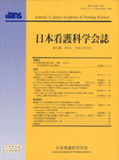Japanese
English
- 販売していません
- Abstract 文献概要
- 参考文献 Reference
- サイト内被引用 Cited by
要旨
本研究の目的はMishel Uncertainty in Illness Scale-Community Form(MUIS-C)日本語版の信頼性と妥当性を検討することである.MUIS-Cは慢性疾患患者または家族の不確かさを測定する用具として開発された尺度であることより,調査は外来通院中の自己免疫疾患患者と2型糖尿病患者の協力を得て行った.
信頼性のうち内的整合性に関してはCronbach's α係数が0.82~0.88,折半法のSpearman-Brownは0.71~0.86であり,十分な内的整合性が確認された.しかし,糖尿病患者を対象とした再テスト法ではr=0.61であり,0.7の基準をやや下回る結果であった.
妥当性についてみると,回答はそれぞれの疾患の臨床的特徴を反映したものであり臨床的妥当性は確保された.併存的妥当性についてはMUIS-CとPAIDとの相関係数が0.41であり,一定程度確保された.構成概念妥当性についてはMishelの不確かさの概念モデルに照らして,適応に対応すると考えられる主観的QOLを従属変数として重回帰分析を行ったところ,不確かさ,病状の不安定さ,ソーシャルサポートが関連していることが示された.
以上の結果より,MUIS-C日本語版は今後洗練する必要があるが,臨床での使用基準を満たしていると考えられる.
Abstract
The purpose of this study is to examine the reliability and validity of the Japanese-language version of the Mishel Uncertainty in Illness Scale-Community Form (MUIS-C). The scale has been developed to measure perceived uncertainty among chronically ill patients or their families. As such, outpatients suffering from autoimmune diseases and type-2diabetes participated in the study.
In terms of internal reliability, the results were sufficient (i.e., above the criteria value). Cronbach's coefficient alpha was 0.82and 0.88. When the Spearman-Brown split half formula was incorporated into the split-half method, the coefficients were 0.71and 0.86. However, the test-retest method obtained r=0.61for type-2 diabetes patients, which is slightly smaller than the criteria value of 0.7.
In terms of validity,since the responses closely agreed with the characteristics of their illnesses, clinical validity is sufficient. Concurrent validity was supported by the correlation coefficient between MUIS-C and the scale of Problem Area in Diabetes Survey and was 0.42 (p<0.01). Construct validity was evaluated based on the model of perceived uncertainty in illness.Multiple linear regression analysis indicated that uncertainty, symptom instability, and social support were significantly related to the quality of life which corresponds to a psychological adaptation of the model of perceived uncertainty in illness.
Therefore, this study suggests that the Japanese-language version of MUIS-C is in need of further refinement, but is considered an efficient tool for clinical use.
Copyright © 2004, Japan Academy of Nursing Science. All rights reserved.


